- Home
- Fay Weldon
The Rules of Life Page 2
The Rules of Life Read online
Page 2
‘Do not, I beg you, said Father McCree, at the children’s service, be like the little girl who in her wilfulness stained her purity. How I hated the priest with his little piggy eyes and his soft mouth; he’d never tasted a big ripe luscious blackberry in all his life. I knew it intuitively, even as I knew his fat white hand, if only it dared, would creep up under my crisp blue-braided cotton dress, and stretch the gap between my pale pink knickers, and in and up to peek and pry, as if the nails of his fingers were eyes and could see.
‘When I got home I spilled ink all over my dress. I wanted to be stained. Nanny McGorrah did her best to get the splodges out, but used hot water instead of cold, thus fixing the stain. Ink-spots should be removed by dipping the part first into cold water, and only then into hot, then spreading the fabric on the hand or the back of a spoon, pouring a few drops of oxalic acid or salts of sorrel over the stain, and rubbing and rinsing in cold water until removed. Alas, my mother, Lady Emerald, was no more knowledgeable than Nanny McGorrah in such matters; all their efforts achieved was the spreading and splodging of the stains, and the dress had to be abandoned altogether. A pity. My mother could never keep her mind on anything difficult or unpleasant for more than five minutes at a time. My father was consistently unfaithful to her, knowing it scarcely mattered. A new hat or an outing to a tea-dance would quickly cure any sense of grievance she might have. I think they were very, very happy together. I was their only child. I took care to be pleasant and loving towards them, whilst reserving kicking, biting, spitting and shouting for Nanny McGorrah, who loved me in spite of it. I remember concluding at an early age that she was obliged to love me, inasmuch as I was her source of income.
‘People love where it is in their interests to love,’ remarked Miss Sumpter, ‘that is another observable rule of life. Love is the great excuse: I cannot leave my wife because I love her means, “I cannot leave my wife because of the inconvenience and trouble involved, and besides I am frightened.” I will not leave this nannying job because I love the child merely means, “the devil I know is better than the devil I don’t.” Nanny McGorrah was a weak, sloppy, amiable and sentimental woman. Her stomach—she undressed in front of me thinking, wrongly, that my childish eyes were uncritical—hung in folds over white flannelette drawers. I resolved I would never allow my stomach to do such a thing. My father’s belly stuck out proudly: it went before him as a token of his amiability, prowess and success. Timothy Tovey’s, I may say, did the same for a year or so, when he was in his early fifties. Janice put him on a diet. (Put him on a diet! What impudence. How wives do delight in pretending to be mothers!)
‘Timothy Tovey would come straight from some dinner party, where his wife had obliged him to dine on melon, lean steak and salad and black coffee, to the bedroom at Terra Rosa, where I would press cream chocolates between his lips with my tongue, to assuage his hunger. Or else we would simply go out to dine, publicly. Hunger, even more than lust, makes a man imprudent. Janice could not understand why he took so long to lose weight. Poor Timothy, married to such a fool! But, of course, a rich fool. We both benefited from Janice’s wealth, and connections.
‘I have never been an ostentatious spender: it is vulgar to be seen to spend. But it is undeniable that I have always liked to be surrounded by what is fine, and delicate, and subtle—and such things are not cheap. Our bedspread was of golden lace laid over black lace, laid over white: Frieda Martock would come in once every three months to see to its cleaning. The three layers would first be unpicked and separated. To clean the gold lace she would mix the crumb of a 2lb loaf with ¼lb of powder blue—still to be found in a few hardware shops. The crumb would be rubbed fine and the blue mixed with it, and the mixture simply laid plentifully on the lace, until it brightened. Then the lace would be brushed clean with flannel and rubbed up gently, very gently, with a piece of crimson velvet. The result never failed. The black lace would be passed through a warm liquor of water and bullock’s gall (Harrods supplied this, for a large fee: I used Janice’s name) then rinsed out in cold water. A small portion of glue would be dissolved in boiling water, and the lace passed through it; Miss Martock would clap the stuff here and there with her rheumy hands—clap, clap; the sound of attention to detail rang through that pretty proper little house, as it had for more than two hundred years—to revive and restore its texture, and then pin it in a special frame to dry.
‘It was in fact the frame of one of the very large family paintings which my first suitor, the arsonist Walter James, had taken into his head to burn, hoping thus to avenge his wrongs. The frame had escaped the fire: it was the last thing my father managed to save before the fire consumed him too, and now it served this excellent purpose. That did for the black lace—the layer of white silk bone lace took longer than anything, of course. First Miss Martock had to unstitch the composing pieces—the spread was made of twenty sections, each nine inches wide. These she wound around some six specially prepared muslin-wrapped glass bottles, tacking lightly into place to prevent wrinkles, matching edge to edge exactly. Over these layers she would place a linen cloth, which she would rub firmly with soap and cold water, and leave overnight for the lather to seep through the layers. The whole would then be rinsed through and through with cold water—never hot, for hot water yellows any white fabric, and of course weakens it—preferably outside, but never in direct sunlight. The lace would next be unwrapped, laid flat to dry, restitched, the covering layers of black lace and then the gold sewn, and the whole placed back upon the bed. Sometimes Timothy Tovey and I made love upon the bedcover and not beneath it: gold lace is ever so slightly scratchy, and we liked that. I felt it was right that my skin should suffer, even as the lace did, and vice versa—that to contribute, even in a minor way, towards this pinnacle of human pleasure, the feel of his flesh in mine, mine around his, tongue to nipple, nipple to teeth, was worth a little damage to the lace! Even that we should, in the course of time, wear it altogether away seemed no bad thing.
‘I could feel, as my naked skin encountered the lace, the frisson of poor Frieda Martock’s disapproval. She lived and will no doubt die (unless, poor old soul, she is raped by one of those city prowlers who have a penchant for old ladies) a virgin. The nearest she can get to the sacrament of sex is by the patient washing of the lace which covers my and Timothy Tovey’s illicit bed. Frieda Martock was born patient, good and plain, not brilliant and bright, into a world which killed off the males of her generation by the million and doomed her kind to a dismal half-life. From them that hath not shall be taken away. That is the rule engraved in gold over the Gates of Life.
‘Janice Tovey has easy-care sheets in polyester, and terylene-filled duvets, and Timothy told me once he and she had twin beds. Although when, some fifteen years ago, a series of television documentaries on the historic political houses of London was screened, and the cameras went inside the Tovey household, it seemed to me that their bed was very double indeed: or else—worse—that the beds had been pushed together. I had never myself been in their bedroom, although Timothy Tovey and I often enough made love in the spare room extension above the big garages where the Rolls and Bentleys were kept. He liked to have me on his premises: he would have had me in his and Janice’s bedroom, but I always refused. So vulgar! As if we took the marriage seriously enough thus to insult it.
‘The sight of the double bed did, I admit, disconcert me. I switched off the television set and waited for Timothy Tovey to come round at eleven for his chilled cream-filled chocolate and his glass of Monbazillac and the pleasure of unbuttoning the dozen small silk buttons that ran down the back of my Thai silk dress. He came on time. He smiled. He did not mention the programme: no doubt he hoped I had not seen it. He was disingenuous. This, more than the sight of the marital double bed, made me angry. I took care not to show it. I murmured and smiled and charmed as usual. Only when he had undone the last button did I slip away from him.
‘“You lied to me,” I said. “You and Janice share a double bed.”
‘Now remember that Timothy Tovey was trained as a diplomat. “We sleep in a double bed,” he said. “But do we share it? I am not so sure. And since we are also unsure about the very nature of truth I think it unreasonable of you to believe you can define a lie, and therefore define me as a liar.”
‘I flung what was left of my wine at him, and the glass hurtled through the air and caught and cracked one of my collection of erotic glass paintings. This one was delicately tender, of lesbians and butterflies sporting in the grass; Lesbos innocent and fragile as it was seen to be in the reign of the young Victoria, from which era the painting originated.
‘“Now see what you’ve done,” I wept, and he laughed and held me, and promised to buy me another painting, as if I were a child to be teased, tempted and cajoled. But I was not my father’s child for nothing. I knew that just as a new kitten cannot replace a familiar old tomcat, inasmuch as mere charm and prettiness, instant purrings and rubbings, fall short in the balance against the weight and resonance of a tough shared experience, so a new work of art can never replace one carelessly destroyed. I also knew in my heart that the glass painting hardly counted as art, merely as the curious and decorative; but I would not let Timothy know I knew. A tragedy had occurred. There was to be no consolation.
‘“It is a bad omen,” I wept. “The glass is shattered: your lies shattered it. Now you and I will have seven years’ bad luck.”
‘“Gabriella,” he pleaded, “be reasonable. You lost your temper and threw a glass at the painting, so it cracked. That’s all.”
‘“You are very clear when it comes to describing my actions,” I said, “but very obscure when it comes to your own. Well, you are a diplomat. I suppose it is only to be expected. Go home to your wife and practise your diplomatic skills on her. Lie as much as you like to her, but I’ll have none of it, or you, for seven years.”
‘“Darling,” he said, “seven years is for mirrors. This is only a piece of painted glass.” But he was quite pale. He knew what was coming.
‘“Five years, then,” I said.
‘“Two,” he pleaded, and I settled for three.
‘I am a woman of my word. I did not see Timothy Tovey again for three whole years. I would not. I unplugged the telephone and shut my ears against the ringing of the doorbell. Presently I went to Corfu, and lived with Stavros until the three years were up. Timothy Tovey always referred to Stavros as “your Greek waiter” in the same tone of voice in which I would refer to Janice as “your poor wife”. In fact Stavros owned shipping lines and vineyards. Timothy was right in one sense: he was no gentleman—but that’s another story, as a result of which few rules can be formulated, except that the best way of washing linen sheets is in running mountain water. Even though water gushed plentiful and hot-and-cold from gold taps in all of Stavros’s many establishments, I always had the maids go up the hillsides and do the washing in the traditional way, and the drying likewise. Our bed was scented with thyme and honey. Stavros loved it. Alas, I did not love Stavros. And living with a man who loves you when you do not love him is ageing. Of all things, boredom is the most ageing. But enough on the subject of Stavros. Hairs grew out of his ears, strong and coarse.
‘Now of course I had always known perfectly well that Timothy and Janice would make love from time to time. How could they not? How could the erotic energy generated by Timothy and myself, on top of or beneath the gold-on-black-on-white lace counterpane, not spill over into other beds? I would have been insulted had it not. In a feebly-sexed marriage the cuckolded husband is jealous of the lover, the deceived wife made unhappy by the mistress, because, poor wedded things, they receive only what is left over. If the marriage is strongly sexed lovers and mistresses must grind their teeth with envy, knowing they exist only to sop up the overflow. That is a further truth. Another is that monogamy, amongst interesting and lively people, is rare. Or, conversely, that only those who lack energy, or courage, are faithful. No, I took offence because it suited me to do so, because the routine of our life had become too steady for the preservation and maintenance of romantic love, and, quite instinctively, I knew the time had come to upset it. In my absence, deprived of cream-filled chocolates, Timothy Tovey became quite slim. Janice’s diet plan for her husband suddenly began to work. I daresay she wondered why.’
At this point Miss Sumpter’s voice failed again. I beg readers to remember that she saw life from the balcony of a St John’s Wood villa, and that in spite of what the pinner priests may say, to be dead is not necessarily to be wise. The voice from the grave may mislead. My own wife is a very fine, brave and interesting woman, and I am convinced the very model of sexual propriety. She is a botanist, and would be ashamed to live as Gabriella Sumpter lived. Miss Sumpter, it seems, never had anything so vulgar or demanding as a job in her entire life.
When Miss Sumpter’s voice resumed she was giving instructions as to the removal of scorch stains from white linen. Take ½ pint of vinegar’, she said, ‘2 oz. Fuller’s earth, 1 oz. of dried fowl dung, ½ oz. of soap and the juice of two large onions. Boil all together to the consistency of paste: spread the composition thickly over the damaged part, and if the threads are not too far gone, or actually consumed by fire, every trace of scorching will disappear after the article has been washed once or twice’. Miss Sumpter says she had Frieda Martock use this method on the tablecloths from the linen cupboard which were badly scorched by the fire at Covert House, and very successful it had been. The fire she referred to was, presumably, the one started by her would-be seducer, Walter James, in which her father, Sir William Lacey-Sumpter, died. The greater part of Covert House, the family home, had not only been totally destroyed but was totally uninsured. One staircase remained, untouched by the flames, and the linen cupboards tucked under it survived, by one of those quirks of happenstance which so often attend disasters. The recipe for the removal of scorch marks came from Miss Sumpter’s grandmother’s work-book, which happened to be at the Town Museum, for restoration, at the time of the fire. The pinner priests say that one of the phenomena of this kind of replay is what they call the ‘trauma splurge effect’—the subplot, as it were, spilling back during replay into the major scenarios of life. But I am not sure that what we have here is a case of trauma splurge. I suspect Miss Sumpter of regarding the loss of a tablecloth and the loss of a father as fairly equal tragedies. Thank the GSWITS that my wife, Honor, pays little attention to what she puts over her head in the morning in the way of clothes, or the way the curtains hang; just so long as everything is neat and clean, that’s enough for her.
‘Walter James,’ Miss Sumpter goes on, presently, ‘said he wanted to marry me, and I, being only sixteen and knowing little about either life or love, believed him. He was a dark young man with glowing eyes and a haunted expression—the Byronic type, in fact, which experience was to teach me to dislike and distrust. But a young girl all too easily mistakes neurosis for sensitivity, stupidity for courage, duplicity for subtlety and simple insanity for ardour. “He is after the house as much as you,” my father warned me. “He is after your inheritance; after the Rembrandts and the Renoirs: their value will increase with age, as yours will diminish. He is a young man who thinks a lot about money.” But quite how much neither of us realised!
‘I disliked my father for saying this, naturally, and paid little attention to him, because I loved the way that Walter James pressed his full lips on my soft mouth, and delicately inserted his tongue between my virgin teeth, as a promise of so much, so much more to come, if only I would. … His male hand upon my female breast! I had always known, from the moment of their first springing, that this, and not the messy, animal drippings of lactation, was their point and purpose. Breasts spoil the hang of a dress quite dreadfully: there must, I had always supposed, be some great recompense in store to make up for it, and now, with Walter James’s long, brown fingers laid across their rising whiteness, I knew what it was. My father’s voice no longer sounded clear and firm but blurred and i
ndistinct, the mere monkey-chattering of a distant generation.
‘I had no mother to advise me as to whether Walter James was or was not sincere in his protestations of love. I must tell you about my mother’s death. I was eight. Emerald and I were together on the lawns of Covert House. It was late summer: the sun cast long shadows. I was sitting on a practical twill-covered cushion, wearing a finely woven cotton dress smocked over the bodice with yellow thread and with a yellow sash, drinking squeezed orange juice from a fluted glass. (To remove fruit spots, first cold-soap the article, then touch the spot with a paintbrush dipped in chlorite of soda, and dip instantly into cold water, to prevent injury to the fabric.) My mother was sitting in a pretty white-painted Coalbrookdale wrought iron chair. She sipped champagne. She wore a green dress, and her pretty arms were bare and very white. Her face was shaded, against even the late sun, with a straw hat. She knew how bad a strong light is for the complexion. It is always unwise to drink champagne out-of-doors—wasps love it so—and perhaps it was because of the brim of the hat that she did not see the insect struggling in the liquid, and sipped. The wasp stung her throat, and she was dead, poor, pretty, inconsequential thing, within minutes.
‘Seeing her struggle for life, I went running indoors to fetch my father, who I knew was in the house, and found him in his dressing room, naked, on the bed, half hidden by the red velvet cover, half not, with someone I thought for one terrible moment was Nanny McGorrah, but proved to be only Sue Sansippy, my rather elegant governess. My father disengaged himself at once and pulled on his clothes in a great hurry, but by the time he reached my mother she was dead. Sue Sansippy left our employ soon afterwards: my father required her to go. In his mind, I think, he held her responsible for my mother’s death—though how, reasonably, could either he or she be to blame for the wasp sting? Except, I suppose, had my mother been beneath my father and not Sue Sansippy, she would not have been sipping champagne out-of-doors, in the late summer sun when the wasps are sleepy.

 Trouble
Trouble The Heart of the Country
The Heart of the Country Wicked Women
Wicked Women Mischief
Mischief Long Live the King
Long Live the King Remember Me
Remember Me Worst Fears
Worst Fears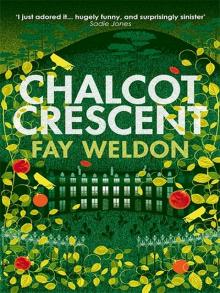 Chalcot Crescent
Chalcot Crescent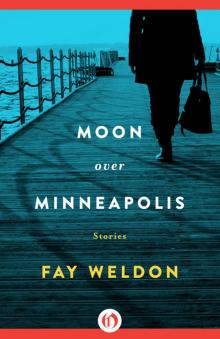 Moon Over Minneapolis
Moon Over Minneapolis The New Countess
The New Countess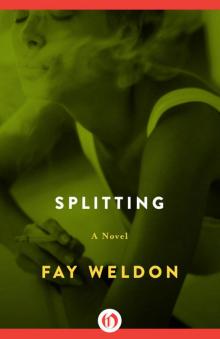 Splitting
Splitting After the Peace
After the Peace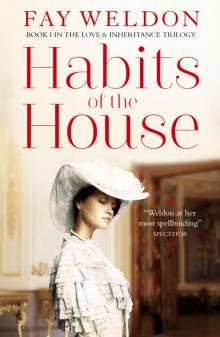 Habits of the House
Habits of the House Darcy's Utopia
Darcy's Utopia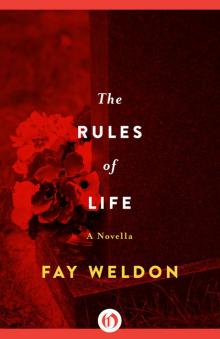 The Rules of Life
The Rules of Life Kehua!
Kehua! Before the War
Before the War Darcy's Utopia: A Novel
Darcy's Utopia: A Novel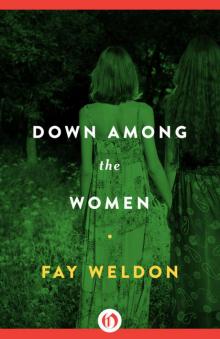 Down Among the Women
Down Among the Women Letters to Alice
Letters to Alice 3 Great Historical Novels
3 Great Historical Novels Female Friends
Female Friends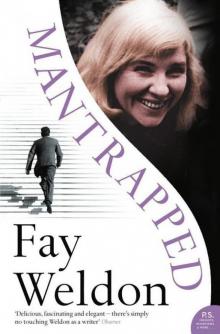 Mantrapped
Mantrapped The Bulgari Connection
The Bulgari Connection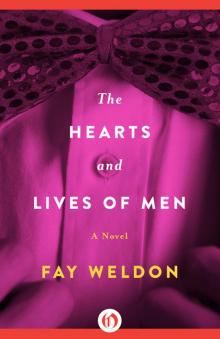 The Hearts and Lives of Men
The Hearts and Lives of Men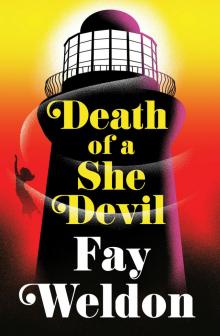 Death of a She Devil
Death of a She Devil